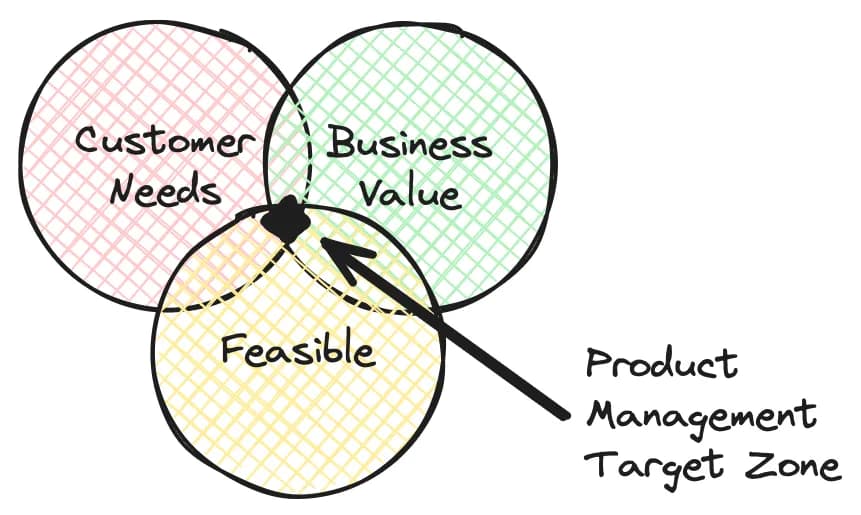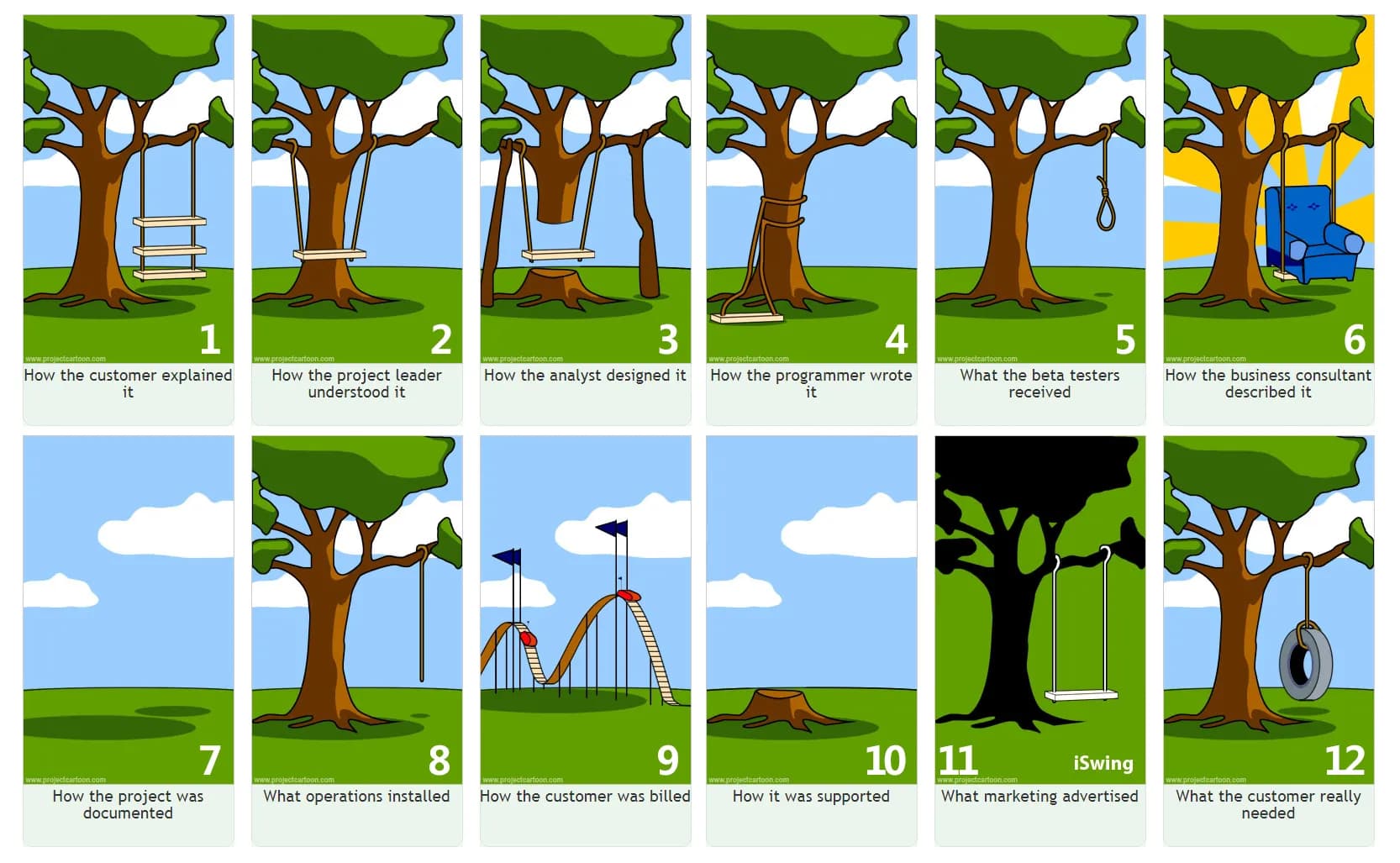What problem do Product Managers attempt to solve?
 Product Managers attempt to ensure that the right product is built, one that meets the needs of users, achieves business goals, and is technically feasible to build in a cost effective and timely manner.
Product Managers attempt to ensure that the right product is built, one that meets the needs of users, achieves business goals, and is technically feasible to build in a cost effective and timely manner.

The primary goal of product management is to ensure that the resources allocated to developing the product are used in the most effective way to develop a product that address the priority issues affecting potential customers while delivering on business objectives.
PMs are obsessed with ensuring the team is building something customers want so that, as long as the product is built correctly and in a timely manner, it is likely to be successful in the market.
Product management is the art and science of planning, developing, and launching products that meet customer needs and generate business value. The role of a product manager is to determine what product to build in order to best address the needs of customers while also achieving business objectives.
What Product Managers Do:
- identify market opportunities,
- defining product requirements,
- Work with cross-functional teams to design and develop the product,
- Manage the product lifecycle, and
- Monitor and improve the product to ensure it meets customer expectations and drives growth for the business.
Product Managers first and foremost need to serve as a vocal advocate for the needs of the customer. Therefore empathy, understanding of their desires, preferences and behavior of potential customers, is essential to the role. This can be accomplished through a combination of qualitative and quantitative research depending on the business context but it is essential for product managers to carve out time to deep-dive on customers in order to serve as their voice within the organization.
With a clear understanding of the needs and priorities of potential customers, the next job of the product manager is to define a prioritized roadmap of epics, features, and requirements to develop or improve the product.
PMs then work cross-functionally with design/UX, engineering, and QA to develop the product in accordance with the defined requirements.
On release the role of the product manager shifts to measuring impact and examining post-launch metrics and feedback to determine next steps; declare victory, iterate, or roll-back.
PMs oversee the entire product lifecycle from concept to launch and iterate. While they don’t often directly manage any individuals on the team, their leadership is instead one of influence and authority to do what is right for the product.
Why does product management matter?
Product Management, when done right, is a force multiplier and allows cross-functional teams to create massive leverage by effectively organizing across disciplines, levels, and roles to gain alignment around a compelling vision and high-impact roadmap. Without product managers, work still gets done, and products still get built; it’s just that they are less likely to hit their mark or have the same impact without clear product leadership to guide the team toward a successful outcome.
Product management matters for several reasons.
-
Clarity and Focus lead to Increased efficiency and productivity: Product management helps ensure product development is focused on meeting customer needs and delivering value rather than simply building features. Clarity and focus can help streamline product development, reduce waste, and increase efficiency and productivity.
-
Customer insights Enhanced market competitive advantage: Product management practices help organizations stay ahead by identifying emerging trends and opportunities, developing innovative products, and positioning them effectively in the marketplace.
-
Better targeted products lead to Improved customer satisfaction: By understanding and validating customer needs, product managers can create products better suited to their customers’ needs and preferences. User-centric design and UX can increase customer satisfaction and long-term loyalty.
-
Systematic Prioritization leads to Better resource allocation: Product management helps organizations allocate resources more effectively by prioritizing product development efforts based on customer needs and market potential. Prioritization can help ensure that resources are invested in projects with the most significant impact.
-
Effective Communication channels Improve team collaboration: Product management practices promote cross-functional collaboration across different teams within an organization, including product management, marketing, sales, and customer support. Effective communication helps align everyone around a standard set of goals and objectives and ensures all stakeholders work together effectively.
Common Misconceptions about Product Management
Product Managers lead by influence, not direct authority
Product managers (PMs) are responsible for the overall success of the product but most product managers do not manage any individuals or resources directly. PMs are unique in most organizations in that the role is one that typically leads by influence, but not direct authority.
A PM often works across design, engineering, marketing, and business intelligence at the minimum to release even simple features. PMs do not generally directly manage any of the individuals on these partner teams but they are required to coordinate across all of them to develop and execute new features.
Product Management is not Project Management
Project Management is a distinct field with unique requirements and success criteria. Project Managers are tasked with coordinating across teams and resources to execute projects successfully, typically under time and budget constraints.
Project management involves planning, organizing, and overseeing the execution of a project from start to finish. It encompasses tasks such as defining project goals, creating schedules, allocating resources, managing budgets, and ensuring the project meets its objectives within the specified time frame. (source: ChatGPT3.5)
Product managers focus on determining what to build next and ensuring the right product is created. Product Managers deal with the ambiguity of determining what experience to offer to which target customers. Project Managers focus on executing clearly defined projects on time and budget. They deal with less ambiguity over scope and goals, instead focusing on delivering those goals predictably under defined resource and time constraints.
Product Management is not Engineering Management
An engineering manager is responsible for delivering technical capabilities. They typically focus on answering HOW the product will be developed, in order to meet the requirements. Engineering managers rely on product managers to determine WHAT to requirements to develop in order to meet the needs of the market,. A product manager, by contrast, is responsible for ensuring that the right product is developed and that, if the product is built successfully according to requirements, it will be successful in the market.
The road ahead for Product Management
Whether or not there is a formal title of Product Manager, Head of Product, or founder, someone in the organization needs to own this function. Every company in every industry operating today that seeks competitive advantage will need a technology-enabled product strategy.
In this blog series, I introduce you to the concept of Product-Led Growth, and I will argue why I believe a Product-Led Growth strategy is the most likely strategy to achieve outsized business outcomes. We will examine PLG and compare it to other Go-to-Market strategies to help you understand why it is so special.
In later articles, I plan to cover topics in artificial intelligence and machine learning as these emerging technologies, coupled with a product-led growth strategy, could provide unique opportunities to solve problems for your users in remarkably innovative ways.